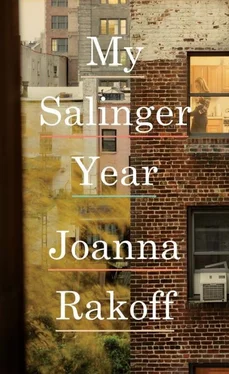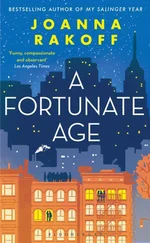“Well, Flaubert is all well and good, but to work in publishing, you need to be reading writers who are alive.” She paused and I suspected that my answer had been wrong. As always, I should have prepared myself more properly. I knew nothing about publishing, nothing about literary agencies, nothing about this specific literary agency.
“I love Donald Westlake, too,” she said, lighting a cigarette. “He’s so funny.” Then, for the first time since I’d stepped into her office, she smiled.
I was tentatively inspecting the books on the shelf above my head—some Agatha Christie paperbacks and what appeared to be a series of romance novels—when the heavy black phone on my desk rang. I picked it up, before realizing that I wasn’t sure of the proper greeting. “Hello?” I said tentatively.
“Oh no,” a voice shouted at me. “Are you there? I knew you were there. Go home.” It was my boss. “The office is closed. We’ll see you tomorrow.” There was a silence, in which I struggled to figure out what to say. “I’m so sorry you came all the way downtown. Go home and get warm.” And then she was gone.
Outside, the bankers were gone, too, presumably toasting their own soaked feet. The wind blew in thick gusts down Madison, twisting my hair into my mouth and eyes, but the street was so silent, so blank and beautiful, that I lingered until my hands and feet and nose grew numb. This was the last Monday on which I’d have no place to be at 9:30 in the morning and there was, I realized, no rush to get home.
There would be other blizzards in New York, but none that generated such silence, none in which I could stand on a street corner and feel myself to be the only person in the universe, none, certainly that stopped the city entire. By the time the next blizzard of such proportions arrived, the world had changed. Silence was no longer possible.
I went home to Brooklyn. Officially, as far as my parents knew, I lived on the Upper East Side with my friend Celeste. After college, when I’d moved to London for grad school, Celeste—whom my parents habitually described as “good” and “nice”—had taken a job teaching preschool and found herself a rent-controlled studio on East Seventy-Third Street, between First and Second. When I stumbled back to New York, she let me sleep on her couch, grateful for the company, then suggested I stay on, splitting her rent. Officially, as far as my parents knew, I had an equally good and nice boyfriend, my college boyfriend, a composer, brilliant and hilarious, in grad school in California. The plan had been for me to come home from London after finishing my master’s, visit briefly with my parents, then move out to Berkeley, to the place he’d secured for us in a complex a few blocks off Telegraph, rings of apartments surrounding a bleak courtyard that looked as if it should contain a pool.
But there was no pool. And I had veered from the plan. I had returned to New York and found that I couldn’t leave. And then I met Don.
On my second day of work at the Agency, I again arrived uncomfortably early, so fearful was I of arriving late. This time around, I stuck my key in the lock, opened the door a few inches, and seeing that the office was dark, the receptionist’s desk unmanned, I quickly closed it and took the elevator back down to the lobby. Madison had been plowed, as had Fifth and the rest of midtown, but the city still felt sleepy, the curbs banked six feet high with snow, pedestrians creeping slowly through the narrow pathways carved along the sidewalks. There was a croissant shop in the lobby, inside which a few dazed customers perused glass cases under the unfriendly eye of a portly South Asian woman in a hairnet. I joined them, turning over in my mind the possibility of a second cup of coffee.
By the time I got back upstairs, the receptionist had arrived and was snapping on the lamps in the foyer, still in her long brown coat. A light shone, too, from the office directly opposite her desk.
“Oh, hi,” she said, in a manner that wasn’t exactly friendly. She unbuttoned her coat and slung it over her arm, then began walking down the hall, away from me.
“I’m the new assistant,” I called. “Should I just, um, go to my desk? Or should I—”
“Hold on, let me hang up my coat,” she said.
A few minutes later she reappeared, fluffing her short hair. “What’s your name again? Joan?”
“Joanna,” I told her.
“Right. Joanne,” she said, seating herself heavily in her chair. She was a tall woman, with a figure my mother would have called statuesque, and she was dressed today in a turtleneck sweater and the sort of fitted pantsuit worn in the 1970s, with wide-legged trousers and wider lapels. Seated in her chair, she appeared not just to tower over but to fully preside over her desk and the room around it. Next to her phone sat a Rolodex of enormous magnitude. “Your boss isn’t in yet. She gets in at ten.” It was 9:30, the time I’d been told the workday started. “I guess you can wait out here.” She sighed, as if I were causing her a great inconvenience, then twisted her full mouth in contemplation.
“Or you can go back to your desk. Do you know where it is?” I nodded. “Okay, I guess you can go back there. But don’t touch anything. She’ll be in soon.”
“I can take her back,” called a voice from the lit office. A tall young man strode through the doorway. “I’m James,” he said, extending his hand. His head was covered in curly light brown hair, his eyes in gold-rimmed spectacles, as was the fashion that year, and his chin sprouted a thick reddish beard, all of which gave him the aspect of Mr. Tumnus, the noble faun in The Lion, the Witch, and the Wardrobe . I took his hand and shook it.
“Follow me,” he said, and I trailed him down the main hallway, past a row of dark offices. As on the day before I longed to linger over the books lining the walls. My eye caught some thrillingly familiar names, like Pearl Buck and Langston Hughes, and some intriguingly foreign ones, like Ngaio Marsh, and my stomach began to flutter in the way it had on childhood trips to our local library: so many books, each enticing in its own specific way, and all mine for the taking. “Wow,” I said, almost involuntarily. James stopped and turned. “I know,” he said with a real smile. “I’ve been here six years and I still feel that way.”
As predicted, my boss arrived at ten, swathed in a whiskey mink, her eyes covered with enormous dark glasses, her head with a silk scarf in an equestrian pattern. “Hello,” I started to say, rising from my chair, as one might for royalty or clergy. But she swooped past me into her office, as if her glasses prevented peripheral vision.
Twenty minutes later her door opened and she emerged, having shed her coat, her enormous sunglasses now replaced by enormous glasses with clear lenses that covered half her pale face, exacerbating the corresponding paleness of her blue eyes. “Well,” she said, lighting a cigarette and positioning herself at one end of my L-shaped desk. “You’re here.”
I smiled brightly. “I am,” I said, rising from my chair, my feet sliding a little in boots I’d borrowed from Don’s roommate, Leigh. My loafers had dried into a sad C shape on the radiator at Don’s apartment. This, of course, was where I was really living: Don’s apartment in Brooklyn.
“Well, we have a lot to do,” she said, pushing a smooth lock of hair out of her face with one long finger. “Now, I know you can type.” I nodded encouragingly. “But have you ever used a Dictaphone?”
“I haven’t,” I admitted. I had never even heard of such a thing. Had she mentioned it in the interview? I wasn’t sure. It sounded like something out of Dr. Seuss. “But I’m sure I can pick it up quickly.”
Читать дальше












